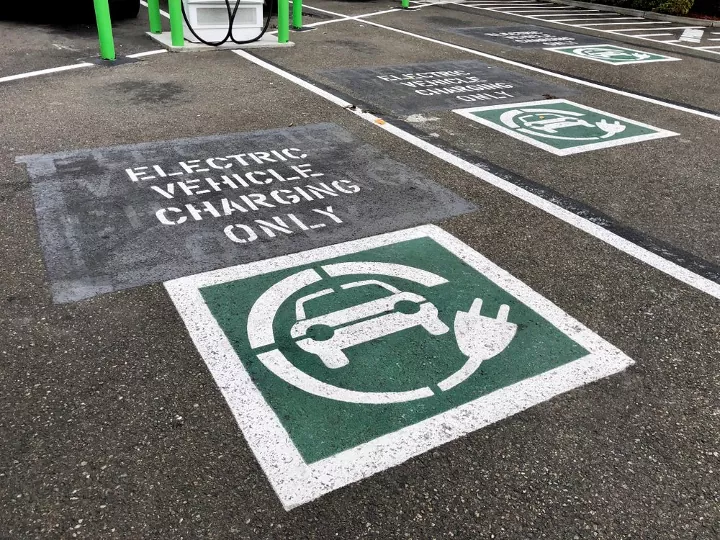Survey Shows Auto Dealers Still Annoyed With Biden EV Strategy

A recent survey, conducted by Automotive News, has indicated that automotive dealerships are still broadly dissatisfied with the Biden administration’s strategy to force the United States to pivot toward all-electric vehicles. According to the 2024 Dealer Outlook Survey, 83 percent of respondents said the government was pushing the transition toward EVs too quickly and mucking up the auto market.
The survey incorporated answers from 208 dealers and dealership managers and the majority agreed that the Biden administration had negatively affected their businesses in 2023. Roughly 55 percent also agreed that having EVs on the lot were actually generating negative interest in the lineup.
"Our roads and electric grid, let alone consumers, just aren't ready as fast as the current administration wants," explained one respondent.
Others likewise said that it should be the market driving EV sales, not pressure from the government.
From Automotive News:
A top concern was the EPA's proposed limits on vehicle tailpipe pollution for 2027-32 model-year cars and light trucks — a regulatory move that, if finalized, could result in battery-electric vehicles making up two-thirds of new-vehicle sales by 2032, according to the agency's projections.
Thousands of dealerships have urged President Joe Biden to reconsider the proposal — which could be finalized as soon as March — arguing it would mandate an unrealistic shift to solely battery-powered vehicles before the market and infrastructure are ready.
"Electric vehicles are exciting. They're definitely overall a good impact for our customers and for the environment, but it's moving too fast," said Michael Lucki, general manager of Riverhead Mazda in New York. "It should be driven by consumer demand, and consumer demand isn't there yet."
The collective dismay was probably best reflected in the question: “Is the Biden administration pushing the industry to move too fast on EVs?”
That query saw an overwhelming majority (83 percent) say yes. Only 8 percent of respondents said no, with 9 percent claiming they were unsure. About half of all dealerships also said they never bothered to register with the IRS to more easily facilitate EV tax credit exchanges. However, about half of those said they at least planned to in the future so customers could get their government refund immediately.
While the Biden administration has a stated goal of seeing half of all new vehicle sales by electric by 2030, it’s technically prohibited from issuing formal mandates requiring what people can use their money to buy. However, it can encourage federal regulators to implement policies so rigid that the industry is required to build EVs in greater numbers and that has been its preferred tactic.
As you undoubtedly know, the automotive sector has spent the last few years patting itself on the back for going along with the scheme and similar programs implemented in Europe. Electric automobiles have, for whatever reason, been framed as a moral good by both industrial and government actors. But the public has remained broadly hesitant to climb aboard the bandwagon as the downsides of EV manufacturing became more apparent.
The industry has likewise had trouble fielding electric vehicles with broad appeal. Luxury-minded electrics are simply too expensive for most people to afford and the more pedestrian models have been seen in the news for battery fires and botched product launches. Some of that is undoubtedly the result of the media landscape trying to draw in eyes. But it’s being reflected in slowing sales, as the electrified segment looks to be approaching market saturation.
That said, sales volumes haven't been great in general and quality control looks to have gone down across the board since 2019. Combustion and electrified vehicles have both seen a drop in consumer satisfaction. Meanwhile, inflationary pressures, caused by excessive government spending and plain-old corporate greed, are forcing average buyers downmarket.
As for dealers, there’s some amount of disagreement as to what’s holding EVs back. Some have argued it’s simply a lack of infrastructure, while others have claimed battery driven vehicles simply don’t work as well for the typical customer. Many stores also don’t want to shell out large sums to refit their facilities in the manner some automakers claim would be mandatory if they want proper EV allocation.
Rising MSRPs were also a concern, with many noting EVs tend to trade at prices far higher than their combustion-driven counterparts and are likewise worse at holding their resale value. That issue was exacerbated by provisions (e.g. Section 30D) issued by the federal government designed to help localize electric vehicle production and ensure wealthy shoppers (who tend to buy more EVs) weren’t being overly advantaged. There are ironically fewer vehicles that actually qualify for government subsidies now than when the U.S. still used production quotas.
"EVs are definitely not a want of our guests today. Who's going to pay that kind of money for that type of vehicle when the infrastructure isn't available?" stated Mike Aus, dealer principal of Durango Motor, which sells Ford, Lincoln, Kia and Toyota vehicles out of Colorado. "Until the prices of them come in line with normalcy, they're going to continue to sit there."
[Image: ZikG/Shutterstock]
Become a TTAC insider. Get the latest news, features, TTAC takes, and everything else that gets to the truth about cars first by subscribing to our newsletter.

A staunch consumer advocate tracking industry trends and regulation. Before joining TTAC, Matt spent a decade working for marketing and research firms based in NYC. Clients included several of the world’s largest automakers, global tire brands, and aftermarket part suppliers. Dissatisfied with the corporate world and resentful of having to wear suits everyday, he pivoted to writing about cars. Since then, that man has become an ardent supporter of the right-to-repair movement, been interviewed on the auto industry by national radio broadcasts, driven more rental cars than anyone ever should, participated in amateur rallying events, and received the requisite minimum training as sanctioned by the SCCA. Handy with a wrench, Matt grew up surrounded by Detroit auto workers and managed to get a pizza delivery job before he was legally eligible. He later found himself driving box trucks through Manhattan, guaranteeing future sympathy for actual truckers. He continues to conduct research pertaining to the automotive sector as an independent contractor and has since moved back to his native Michigan, closer to where the cars are born. A contrarian, Matt claims to prefer understeer — stating that front and all-wheel drive vehicles cater best to his driving style.
More by Matt Posky
Latest Car Reviews
Read moreLatest Product Reviews
Read moreRecent Comments
- Varezhka I have still yet to see a Malibu on the road that didn't have a rental sticker. So yeah, GM probably lost money on every one they sold but kept it to boost their CAFE numbers.I'm personally happy that I no longer have to dread being "upgraded" to a Maxima or a Malibu anymore. And thankfully Altima is also on its way out.
- Tassos Under incompetent, affirmative action hire Mary Barra, GM has been shooting itself in the foot on a daily basis.Whether the Malibu cancellation has been one of these shootings is NOT obvious at all.GM should be run as a PROFITABLE BUSINESS and NOT as an outfit that satisfies everybody and his mother in law's pet preferences.IF the Malibu was UNPROFITABLE, it SHOULD be canceled.More generally, if its SEGMENT is Unprofitable, and HALF the makers cancel their midsize sedans, not only will it lead to the SURVIVAL OF THE FITTEST ones, but the survivors will obviously be more profitable if the LOSERS were kept being produced and the SMALL PIE of midsize sedans would yield slim pickings for every participant.SO NO, I APPROVE of the demise of the unprofitable Malibu, and hope Nissan does the same to the Altima, Hyundai with the SOnata, Mazda with the Mazda 6, and as many others as it takes to make the REMAINING players, like the Excellent, sporty Accord and the Bulletproof Reliable, cheap to maintain CAMRY, more profitable and affordable.
- GregLocock Car companies can only really sell cars that people who are new car buyers will pay a profitable price for. As it turns out fewer and fewer new car buyers want sedans. Large sedans can be nice to drive, certainly, but the number of new car buyers (the only ones that matter in this discussion) are prepared to sacrifice steering and handling for more obvious things like passenger and cargo space, or even some attempt at off roading. We know US new car buyers don't really care about handling because they fell for FWD in large cars.
- Slavuta Why is everybody sweating? Like sedans? - go buy one. Better - 2. Let CRV/RAV rust on the dealer lot. I have 3 sedans on the driveway. My neighbor - 2. Neighbors on each of our other side - 8 SUVs.
- Theflyersfan With sedans, especially, I wonder how many of those sales are to rental fleets. With the exception of the Civic and Accord, there are still rows of sedans mixed in with the RAV4s at every airport rental lot. I doubt the breakdown in sales is publicly published, so who knows... GM isn't out of the sedan business - Cadillac exists and I can't believe I'm typing this but they are actually decent - and I think they are making a huge mistake, especially if there's an extended oil price hike (cough...Iran...cough) and people want smaller and hybrids. But if one is only tied to the quarterly shareholder reports and not trends and the big picture, bad decisions like this get made.


































Comments
Join the conversation
"They should first electrify that border wall."
I kinda got a chuckle out of that meme.
if it were up to the luddites we'd still ;;;
have leaded gas
no seat belt laws
smoke on airplanes
don't let women vote
as it is dealerships and 'top salespeople' are the literal scum of the earth so NFG, go cry all you want dealers ...